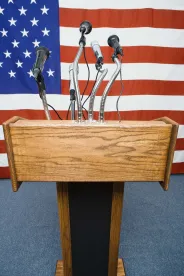In January, U.S. Secretary of State Michael Pompeo travelled overseas for a trip that included stops in Germany, Colombia, Costa Rica, and Jamaica. This was the Secretary’s ninth trip to the Western Hemisphere since assuming office in 2018 and his first overseas trip for 2020, underscoring the Trump Administration’s renewed emphasis on the importance of the hemisphere to the United States. This visit sought to build upon furthering shared priorities – combatting the spread of terrorism, strengthening democracy, expanding prosperity, and ensuring security in the hemisphere, including addressing the situation in Venezuela.
In Bogotá, Colombia, on January 20, Secretary Pompeo addressed the Third Western Hemisphere Counterterrorism Ministerial, with a focus on cutting off funding and illicit activities of regional and global terrorist organizations, such as Hizballah. He also met with President Iván Duque and other regional leaders (Brazil, Bolivia) while in Bogotá, including interim Venezuelan President Juan Guaidó. Counternarcotics cooperation remains a priority with respect to Colombia. With respect to Brazil, the United States affirmed its endorsement of the country’s candidacy to join the Organisation for Economic Co-operation and Development (OECD).
In San Jose, Costa Rica on January 21, Secretary Pompeo met with President Carlos Alvarado and visited the Joint Operations Center, a facility that facilitates regional law enforcement cooperation in Central America. Secretary Pompeo travelled next to Kingston, Jamaica, where he met with Prime Minister Andrew Holness, conducted a multilateral roundtable discussion with Caribbean leaders, and delivered remarks on U.S.-Caribbean relations.
The Trump Administration also remains focused on immigration concerns via the lens of national security, not just south to north flows (such as migrant caravans from Central America) but also more broadly. Effective January 24, the Department of State amended its B non-immigrant visa regulations that are issued for a temporary visit for business or pleasure to address what is commonly referred to as birth tourism. Under the amended regulation, consular officers overseas may deny any B visa application from an applicant whom the consular officer has reason to believe is traveling for that primary purpose of giving birth in the United States to obtain U.S. citizenship for the child. The final rule also codifies a requirement that B visa applicants who seek medical treatment in the United States must demonstrate to the satisfaction of the consular officer their arrangements for such treatment and establish their ability to pay all costs associated with such treatment.
Around the same time that Secretary Pompeo was concluding the Western Hemisphere portion of his trip, U.S. Secretary of Defense Mark Esper travelled to Florida to visit the U.S. Southern Command (SOUTHCOM). In remarks to the media, Secretary Esper noted SOUTHCOM is working to build greater alliances and strengthen partnerships with Latin American allies. Secretary Esper confirmed the greatest challenge facing the United States is preparing for an era of great power competition with China and Russia (as outlined in the National Defense Strategy) around the globe, while adding other challenges in this hemisphere also include drug interdiction and addressing the Maduro regime in Venezuela.
Prior to returning to Washington, Secretary Pompeo stopped in Florida and gave a speech on the Trump Administration’s “America First” policy. With respect to Latin America, Secretary Pompeo noted, “We’re protecting and defending freedom and advancing it around the world in lots of places. We’re advancing freedom in Cuba. We’re working to restore democracy in Venezuela.” He added, “It [the World] sees that it’s time to have our hemisphere, the place we are today, be a hemisphere of freedom.”




 />i
/>i

